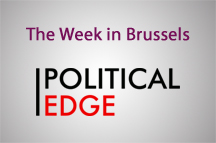 A collective sigh of relief was breathed after EU leaders agreed on Friday that sufficient progress has been made for Brexit talks to move to the future UK-EU relationship in the new year. This is no small feat, as the drama of the last week demonstrated. Unsurprisingly, EU leaders were keen to stress that much remains to be done, in a very short period of time, but there is more optimism in the corridors of Brussels than at any time since separation talks begin.
A collective sigh of relief was breathed after EU leaders agreed on Friday that sufficient progress has been made for Brexit talks to move to the future UK-EU relationship in the new year. This is no small feat, as the drama of the last week demonstrated. Unsurprisingly, EU leaders were keen to stress that much remains to be done, in a very short period of time, but there is more optimism in the corridors of Brussels than at any time since separation talks begin.
What can we expect after the festive season? First, the EU will insist that the political agreement achieved this month be translated into a withdrawal agreement that is legally binding. The EU is a creature of procedure, and this step comes as no surprise to those familiar with Brussels. However, David Davis's own goal this week (describing last week's deal as a mere 'statement of intent') has certainly vindicated those in Brussels who prefer a more procedural approach to the whole affair.
Second, talks need to begin on a transition period. This is essential for business continuity (on both sides of the Channel) given how little time there is before the UK formally leaves the EU. Expect this issue to be tackled early on in the new year.
 Third, talks about the future EU-UK relationship will begin sometime in March, after the withdrawal agreement's completion, but more importantly, after the EU27 have had time to define their position(s). Work is already ongoing in national capitals to identify priorities (read sectors of the economy dependent on the British market), and national positions will need to be reconciled in Brussels. London is in no hurry to talk trade either, given the fact that the cabinet is not in agreement over what it wants to achieve. It makes sense for all parties not to want to box themselves in early on, but only if an agreement on transition can be achieved without too much delay. Lastly, planning for Brexit has become a lot more interesting for business. Instead of focusing on the worst-case scenario (the proverbial cliff edge), companies now need to prepare for a wider range of EU-UK trade scenarios.
Third, talks about the future EU-UK relationship will begin sometime in March, after the withdrawal agreement's completion, but more importantly, after the EU27 have had time to define their position(s). Work is already ongoing in national capitals to identify priorities (read sectors of the economy dependent on the British market), and national positions will need to be reconciled in Brussels. London is in no hurry to talk trade either, given the fact that the cabinet is not in agreement over what it wants to achieve. It makes sense for all parties not to want to box themselves in early on, but only if an agreement on transition can be achieved without too much delay. Lastly, planning for Brexit has become a lot more interesting for business. Instead of focusing on the worst-case scenario (the proverbial cliff edge), companies now need to prepare for a wider range of EU-UK trade scenarios.
The European Council banked another few agreements, including (among others) military cooperation (PESCO), social policy, climate change and sanctions against Russia. Cheers all around it seemed. But late on Thursday night, the debate on migration quickly turned sour and exposed (again) deep divisions between Member States. Disagreements over migration and refugee policy are not exactly new, but they are eating away at the EU's unity at a time when the bloc is trying to forge consensus in other areas (for instance with regard to Eurozone governance). They also point to growing acrimony between eastern and western Member States, an issue that is likely to come to a head next year.
Today, though, Brussels is in a festive mood.














